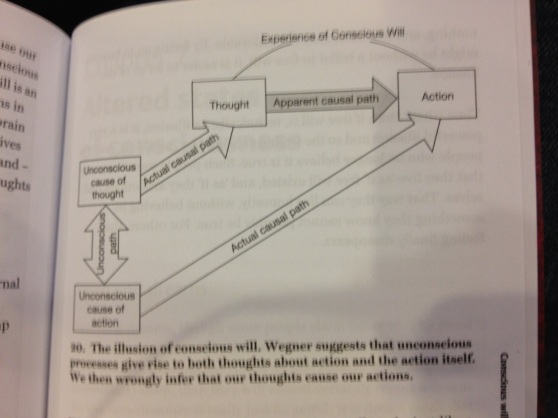The image above (from Blackmore 2005) is designed to show that we are not truly in control of our actions, or at least not in the way that we intuitively believe we are. There are, however, a number of flaws, or at least oversights or shortcomings, associated with this position that I’d like to illuminate:
1) The schematic presented is based on only a handful of empirical results. At most, this can be used to explain those results. Of note is that the experiments that generated these data were designed with the express purpose of deceiving the subjects. This in mind, the model fits those phenomena almost perfectly. As for its generality to ordinary phenomena, the link is less than clear, at best. Either way, further research is needed.
2) If we accept that the model is intended to be a general principle, then we can still point out that it overlooks the possibility of downward causality, or at least an interaction between thought and action. This could be shown by an additional causal path between the processes that, respectively, generate conscious thought and behaviour, downstream of the initial breakpoint. If nothing else, this would allow for mutual reinforcement or modification between conscious thought and associated behavioural outcomes. This position lies somewhere between fully conscious control and fully illusory conscious control, and seems most plausible.
3) Further, defining conscious control as fully separate from non-conscious processes is to define it so that it is necessarily false, excepting an embrace of true substance dualism. It is generally accepted that consciousness arises from brains, again excepting substance dualism. Combined with the evolutionary fact that consciousness evolved closer to the present than did non-conscious processes, it stands to reason that all conscious processes depend in some way on non-conscious processes. This does not extinguish the role of conscious thought, it merely splits the role of control between non-conscious and conscious mechanisms, but says nothing as to the balance between the two. This might be seen as an attack on free will, but it actually fits everyday intuition better than either of the extreme views. For example, most people recognize the power of reflexes and internal biases–these represent part of the non-conscious aspect of control. Planning and deliberation, on the other hand, make up part of the conscious side, though parts of these could be arguably identified as non-conscious (and vice-versa for the non-conscious processes listed above, as conscious control can influence internal biases).
This last point is largely an objection to a specific piece of empirical data and its interpretation in some circles that is in many ways similar to Wegner’s above. The view goes like this: The physiological correlates of an intention precede conscious awareness of an intention. Therefore the intention is not consciously formed, it is entirely the result of non-conscious processing. As above, this approach seems misguided. To assume that a conscious thought could simply spring into existence before any underlying neurobiological activity can be recorded is nothing more than substance dualism–and is not the view that needs refuting. If conscious states arise from the brain, then it holds that some activity in the brain must occur before a thought can be known. Does this fully discount conscious thought as a causative agent? My response, as above, is a definite no, it simply shows that not all aspects of the causation for behaviour can be accounted for by conscious intentions. This is not the same as saying that none of it can be.
